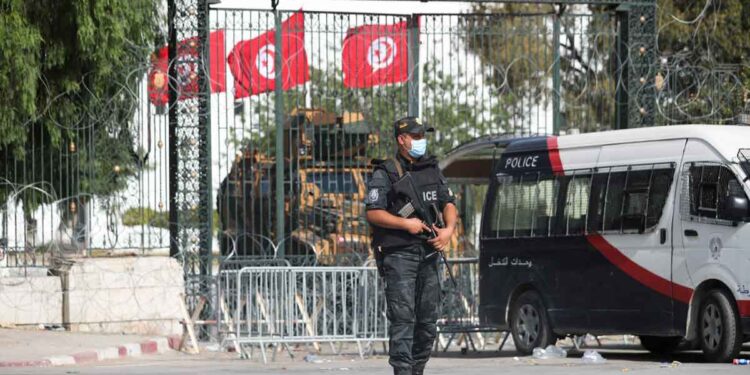Tunisian security forces accompanied by members of the “HAICA” audio-visual communication authority raided Al-Zaytouna TV headquarter, on Wednesday, claiming the the channel’s station broadcasting “outside the framework of the law.”
Lotfi Al-Tawati, the channel’s editor-in-chief, considered the storming of the channel’s headquarters and the seizure of its equipment a “political decision,” and said that it “punishes Zaitouneh for its opposition to the recent exceptional decisions of President Kais Saied.
Tunisian journalists have expressed their concern over “freedom of opinion and expression”, especially since Tunisian President Kais Saied announced, on July 25, exceptional measures, including the dismissal of Prime Minister Hisham Al-Mashishi, the freezing of parliament’s powers, and removing impunity of deputies.
The Tunisian Journalists Syndicate warned of the danger of the “silencing,” calling on the Tunisian president to adhere to his previous pledges to guarantee rights and freedoms.
In a statement regarding judicial and security measures taken against press institutions and media professionals, the Syndicate stated that it “follows with great concern the deterioration of the situation of freedoms in our country, and the escalation of attacks and prosecutions, especially the recent referrals to the military courts over the expression of opinions and ideas; which would undermine the gains of the revolution, the foundations of the civil state, and the values of democracy, pluralism and diversity.”
The Syndicate affirmed its “absolute rejection of military trials of civilians for their opinions, positions and publications,” considering this a “setback to freedom of expression and a blow to democracy and the right to disagree.”
It also announced its “total rejection of tracking journalists and opinion-makers based on their opinions and ideas,” considering that “professional errors and publishing issues are within the scope of the amendment bodies (regulators) of the profession and Decree 115 of the press, printing and publishing,” which prohibits the imprisonment of journalists for their work.
Thesyndicate called on President Saeed to “activate his previous pledges to guarantee rights and freedoms” in the country.
Since last July 25, Tunisia has been experiencing a severe political crisis, as President Saied has taken a series of decisions, including freezing the decisions of the Parliament, lifting the impunity of its deputies, abolishing the constitutionality monitoring body, issuing legislation by presidential decrees, appointing himself to head the Public Prosecution, and dismissing the Prime Minister, provided that he assumes the executive power with the assistance of a government.
Since then, journalists and media institutions in Tunisia have been subjected to restrictions, security prosecutions, arrests, and judicial follow-ups for their activities.
Over the past period, the security forces arrested six members of the Tunisian parliament, which raised concerns for human rights organisations that Tunisia will become tyrannical and totalitarian country that does not respect the law, disregards human rights and freedom of expression, especially since some of these arrests were based on military judicial decisions against civilians; an action which these parties reject.






























